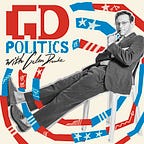The video version of this podcast is available here.
Last week I had the chance to speak with Republican Senator from Alaska Lisa Murkowski at length. She was candid about many things: Her openness to the idea of leaving the G.O.P, her aversion to bombing Iran, and the safety concerns involved in being a lawmaker during a period of increased political violence.
She also discussed her feelings about Justice Brett Kavanaugh’s performance on the Supreme Court (after voting not to confirm him), her likelihood of supporting the “One Big Beautiful Bill Act,” and why she thinks the U.S. shouldn’t have closed primaries.
Sen. Murkowski has represented Alaska in the U.S. Senate since 2002 and her new book is called, “Far From Home: An Alaskan Senator Faces the Extreme Climate of Washington, D.C.” Below are some excerpts, edited for clarity, from our conversation, which took place on Thursday, June 19.
On Iran
Galen Druke: I read your book cover to cover. I have it right here. I've also listened to plenty of interviews that you've done in Alaska and I even follow you on Instagram. So I promise that I will get into the deeper questions that your book brings up. But I have to ask you the most pressing question out of the gate, which is, should the US bomb Iran?
Sen. Lisa Murkowski: I don't… No.
Druke: No.
Murkowski: I mean, OK, your question is, should we bomb it? Could we do targeted strikes that don't bring us into a full throated war? That's a subject of discussion. But I am really concerned about just the escalation that we're seeing. literally hour by hour, although I did see something now just about an hour ago where the president is saying he's going to give two weeks. But you know he may change his mind on that too. But I absolutely recognize the right for Israel to defend itself and appropriately so. But I think none of us want to see the Middle East embroiled in a massive all-out war that would bring the United States into it.
Druke: But on the question of simply should the US bomb Iran, you said no.
Murkowski: Reflexively, no.
Druke: Reflexively no. All right. But it sounds like you'd be open to hearing arguments for targeted strikes.
Murkowski: I think, yes, the answer to that is I would be open to listening to those arguments. I think we in Congress should be having just this kind of information brought to us. I'm told that next week we're supposed to have an all members meeting to discuss the situation in Iran. We are gonna have discussion, debate on the floor with regards to a War Powers resolution. So we are in the midst of some really pivotal decisions that need to be guided by good information. And so I sure hope somebody doesn't, from the administration, doesn't come in and say, ‘we just have to, we gotta bomb Iran and we're going to go forward with it.’
That's not how we need to be having this really weighty debate. And I was going to call it a conversation. I don't like the word conversation because how do you have a conversation about the potential for war? But I want to make sure that this is not a one-sided thing, right? That this is not just the administration. It's not just President Trump in the middle of the night that says, all right, I'm going, I'm all in and everybody line up behind me.
We have a role. Congress has a role in this and how we make sure that this is more of a discussion that goes on rather than we'll act now, tell you later. I think that that's important.
On The Prospect Of Leaving The G.O.P
Druke: Say Democrats win three seats in the next midterm election in the Senate and they say, ‘we're going to let you pass bills that benefit Alaskans if you caucus with us. You don't have to become a Democrat. You can be an independent. But if you caucus with us and provide the sort of fourth vote that we need to get from where we are now and you can pass legislation that helps Alaskans,’ would you do it?
Murkowski: It's an interesting hypothetical. You've started off with the right hook here is if this would help Alaskans, because at the end of the day, that's…
Druke: I know you. I've done my reading.
Murkowski: Yeah, you do. Yeah, see? This is why this book is kind of scary, because now people know what motivates me, and it's this love for Alaska and what I can do. So that's my primary goal. I have to figure out how I can be most effective for the people that I serve. That's why I'm going to continue to do a really hard job, because I want to try to help people.
Problem with your hypothetical is that as challenged as I think we may be on the Republican side, I don't see the Democrats being much better. They've got not only their share of problems, but quite honestly, they've got some policies that I just inherently disagree with.
One of the things that I thought was interesting in the book, when we're writing it, was this whole effort prior to me deciding that I was going to launch the write-in, people were looking at what happened after the primary and they said the only way that you're going to retain this seat is if you basically have your name on the ballot and the only way to do that is to basically carry the flag of the Libertarian Party because that was the only party outside of the Republicans and Democrats. And so they said basically, you be a Libertarian for a day to get elected.
And they dangle that in front of me and all of the people that I was talking to said, this is of course what you have to do. And I said, I can't do that. I can't be somebody that I'm not. I can't now say, I want this job so much that I'm going to pretend to be somebody that I'm not. That's not who I am.
Druke: Yeah. But I guess the question is, you wouldn't become a Democrat, right? In this situation, you would be independent. And the next time Republicans are close to a majority, you could caucus with them. But I guess I more ask, is there a world in which by becoming unaligned or an independent, you could help Alaskans that you consider it?
Murkowski: There may be that possibility. let me put it into context from where I'm from. In Alaska right now, our legislature is governed by coalition. It's 14-6 and 21-19 in the House and in the Senate. We got a small legislature. But coalitions in both bodies. And this is one of the things that I think is good and healthy for us and I think actually is one of the reasons why people are not surprised that I don't neatly toe the line with just party initiatives because we've kind of embraced a governing style that says if you've got good ideas and you can work with her over there, it doesn't make any difference if you're Republican or Democrat. We can govern together for the good of the state. And so it is a coalition government. It's not a Republican majority or a Democrat majority. It is a coalition government.
Druke: So, if Democrats won three seats in the next election and offered you ways to pass bills that benefit Alaskans if you caucused with them, you'd consider it?
Murkowski: So could we do that? If we're talking about some kind of a coalition, that's something that, again, is not foreign to Alaskans. Is it foreign to our operations in the Senate? Yeah. It's not foreign in other governing bodies. You look at the makeup in so many other countries. So I'm evading your answer, of course, because it is so supremely hypothetical.
Druke: But I think...
Murkowski: You can tell that the construct that we're working with right now, I don't think is the best construct.
Druke: Mm-hmm. But it sounds like you're saying yes.
Murkowski: Is it something that is worthy of exploration? See, you're looking to make news today. Murkowski is going to head a coalition government.
Druke: I know, come on, I'm the little guy here, you know? Help me, you know, don't give it to CBS, don't give it to ABC, give it to me.
Murkowski: This is one of the things where when we talk about election reform and ways that we can actually break down some of these really partisan divides that come up, I think it's some of the things that we're seeing in a place like Alaska where we're talking about coalitions that come together, where you have ranked choice voting that encourages people, you have a greater likelihood of being elected if you are not viewed as just the wholly partisan, but you're supported by a group over here. Plus, there's a lot of folks that really like you as your number two. And so this idea of kind of melding different political thoughts. I don't know if that's the way I want to phrase it. If I saw that in writing, I probably would disagree. But it is a different way of looking at how we are addressing our problems, rather than just saying it's red and it's blue.
Druke: I do want to ask specifically about Alaska's system. I'm pretty nerdy. I've done whole docu-series about gerrymandering and different types of voting and the like, and I'm going to move on to that, but was that a yes? Yes, there's some openness to it.
Murkowski: There is some openness to exploring something different than the status quo. How's that?
Druke: Okay. All right. All right. I'll take it.
On Legislating In A Time Of Increased Political Violence
Druke: I ask in part about your apolitical life because they can't be totally separate. You talk about your staff not wanting you to walk to work solo after January 6th. You mentioned that there are people or at least a person who served time for threatening you. I mean, we're also talking less than a week after a Minnesota lawmaker was assassinated and another was wounded in what's been described as targeted political violence. And so I'm curious how this current climate changes the kind of person that you can be even outside of the political arena.
Murkowski: Yeah, it does. It does change things because I would be foolish, I would be naive to think that I'm just I'm just another person walking down the street. I am a normal person, but I've got an extraordinary job. Right? And that extraordinary job as as one of a hundred in the Senate allows me to be of interest to those in the media who will put my name and put my face out there. And so I have to have a level of awareness. And in fairness, I don't like that.
I'm having a good conversation with you, but I really don't like talking about myself. When I am in these scrums in the halls of the Capitol, it's just like, back off, everybody give me some space. I really, why do I have to answer you? And then I have to remember, OK, I'm a public servant, right? I do have to answer to my constituents. I don't have to answer to every reporter, but I do recognize that I am in that public space and there’s a lot of unrest out there and I've got to be aware and it's not in my nature to be nervous or to feel like I'm in a big city so I have to be careful. I've had to learn that and it's just not easy.
I'd much rather wander around in my anonymity, go take hikes and with the only security being my my son's Labrador Retriever that's going to make sure there's no bears around.
Druke: Yeah, you talk about this sort of having to become aware and more careful in public in a space that's not the Capitol. Does this environment also change the kind of person or lawmaker that you can be in the political arena?
Murkowski: For fear of physical or personal threat, do you think, or what? Where do you want to go with this?
Druke: Well, I guess I ask, does that fear change what you might say on the floor of the Senate, how you might vote? How you might talk to fellow colleagues?
Murkowski: I know that when I separate myself, say from my party, or take a position or make a statement that would be viewed as counter to the president, I know that there are those who don't like it.
I hear from them, they call my office, send me emails, they're weighing in. Every now and again, we get protests. So I hear that. But I also understand that that is part of what it means to be that public servant: represent, voice your your views as you feel needs to be voiced, and then others may disagree and how they disagree is really what matters, because I'm okay if the fact that you want to send a letter saying I think that you're misinformed. I think you're wrong, I don't like it when they have to get nasty or try to be harsh with the people that are on the receiving end of the phone when they call in, that's not right. But it is certainly their right and their ability to weigh in.
It's when it goes beyond that in a threatening way that I think causes us to kind of step back and reconsider. I shared one of those examples in my book during the Kavanaugh debate. We received, I received a threat that basically said, you know, I'm going to make some foul accusation against one of your sons and see how you like it. And did I have that factored into the back of my head as I was debating all of that? I couldn't separate myself from it. I wish that I could tell you, that didn't weigh in, but it did. And that was hard. And so you can see why you would have voices that are saying, you know what? It's just not, it's not worth it to speak up. But then if you don't speak up, there's consequences to that too, right?












